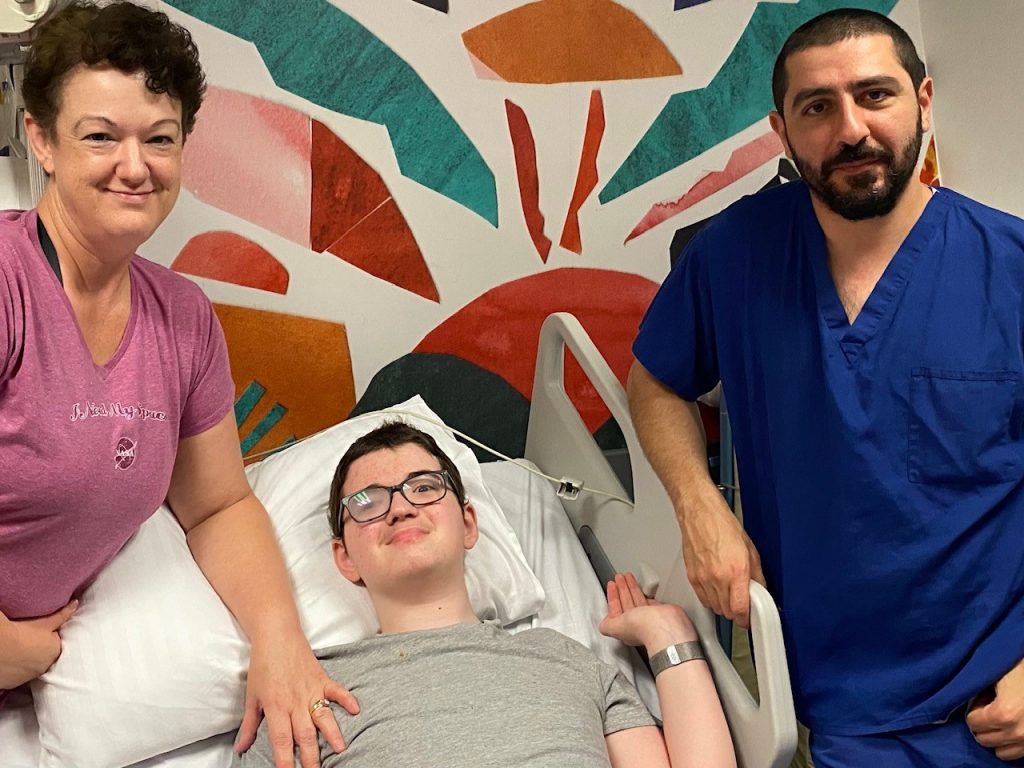Teenage cancer survivor celebrates four year recovery milestone
31 March 2025 - Daniel underwent ground-breaking keyhole surgery at King’s to help remove a rare tumour invading his brainstem

Daniel Huggett was 13 years old when he developed blurred vision and headaches in February 2021. Sophie Huggett, Daniel’s mother, took him to see the optician, initially thinking he had an issue with his vision. However, the optician advised Sophie to take Daniel to their local hospital immediately. Tests revealed that Daniel had hydrocephalus, a dangerous build-up of fluid in his brain.
Within hours, Daniel had been transferred to King’s College Hospital, where he underwent emergency surgery. Sophie, who previously worked as a theatre nurse, said: “We were given the heart-breaking news that Daniel had a large tumour on his brainstem. I will always be eternally grateful to Mr Bassel Zebian and the neurosurgery team who did their utmost to reduce the build-up of fluid in Daniel’s brain; they saved my son’s life.”
Daniel had a rare type of tumour that can block fluid channels in the brain. Sophie added: “Daniel was extremely ill, and after an unsuccessful round of chemotherapy, we knew that further surgery was his only chance. In April 2021, Daniel went through a ten hour procedure to remove the tumour. The team looking after Daniel had to peel the tumour away from Daniel’s brainstem and try to take it all out. We were so worried about how much of Daniel we would get back afterwards.”
Mr Bassel Zebian, Consultant Paediatric and Adult Neurosurgeon at King’s College Hospital NHS Foundation Trust, explained: “Daniel’s tumour was rare and posed a significant challenge not least due to its location deep within his brain. The team at King’s have extensive experience in tackling such tumours. We used a minimally invasive endoscopic (keyhole) approach that allows us to deal with the build-up of fluid and obtain a sample of tumour through the same small incision with a single opening in the skull less than 10mm in diameter. This involves widening tiny corridors in the brain to reach the tumour. In some patients we have been able to remove the whole tumour using this approach with excellent outcomes. We used this technique during Daniel’s initial operation to obtain samples and reduce the bulk of his tumour.”
Bassel Zebian added: “Caring for patients like Daniel is a true team effort and a huge credit goes to our anaesthetists, theatre staff, critical care unit, nurses, rehab colleagues, neuroradiologists, neuropathologists and neuro-oncologists.”
Around eight weeks after his second surgery, Daniel began to show signs he was recovering his speech and mobility, and he was moved to a neurological rehabilitation ward to begin the road to recovery. Four years on from his brain surgery, he continues to thrive at home with his family, despite having ongoing problems with his eyesight, and weakness in his left leg.
Dr David McCormick, Consultant Paediatrician in Neurorehabilitation at King’s College Hospital, said: “Daniel faced significant challenges following his diagnosis and surgery, needing to recover function with his mobility, speech and language, cognition, fine motor control and personal independence. He was supported by an integrated team of specialist physiotherapists, occupational therapists, speech and language therapists, psychologists, doctors and nurses, and responded extremely well. It is a great delight to see the articulate, warm and able young man that Daniel has become with the help of Team King’s and the immense support of his family.”
Sophie added: “It’s almost four years to the day that Daniel was blue lighted to King’s College Hospital, and if it wasn’t for the sheer skill and determination from the amazing neurosurgery team at King’s, he wouldn’t be with us today. Daniel has been, and continues to be, a true warrior. He is a bright and happy 17-year-old, and his positivity is a constant motivation to us all.”
Daniel Huggett said: “I thought my life would be a normal journey through education and beyond; however this tumour was a really traumatic part of my life, and I thought I would never recover. Thanks to this wonderful team, I am now able to return to my family, with many things to look forward to in my future. I am truly forever thankful for the skill and care from the Neuro team at King’s.”
